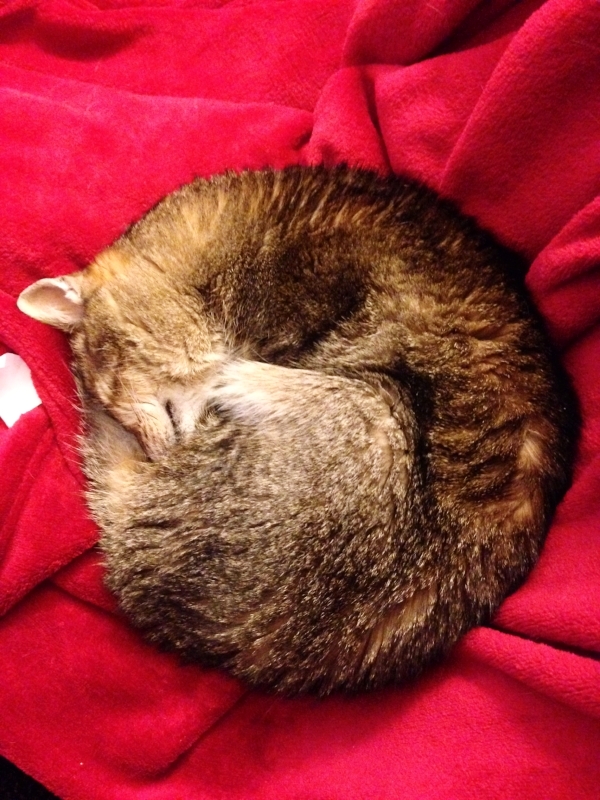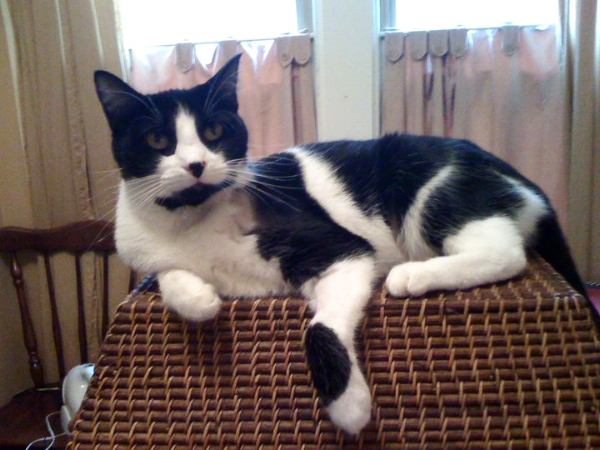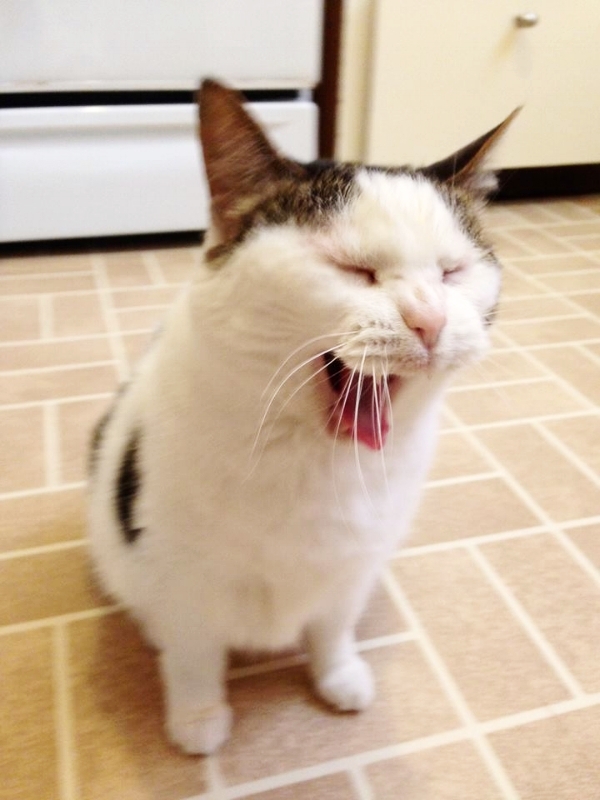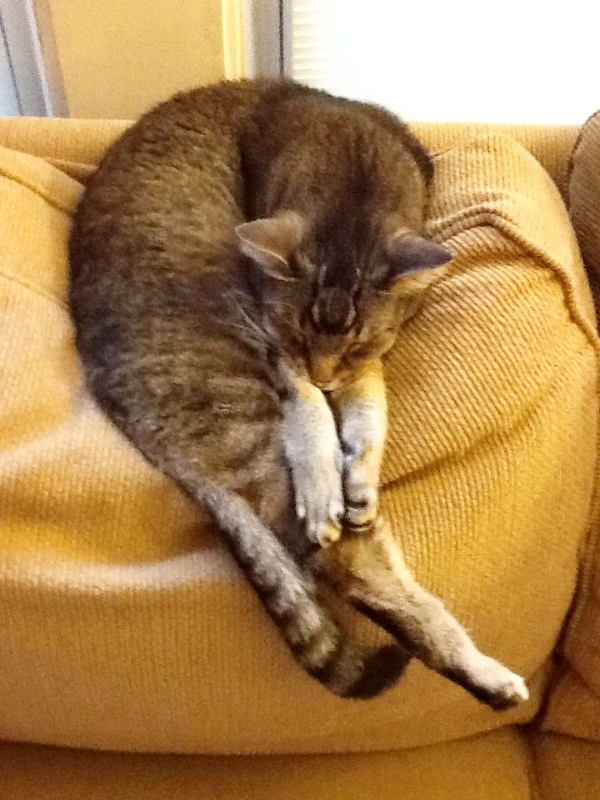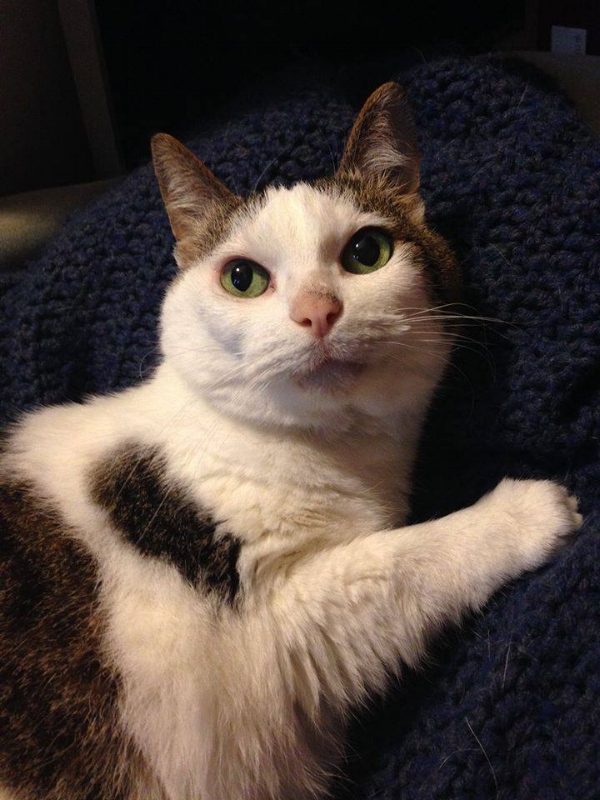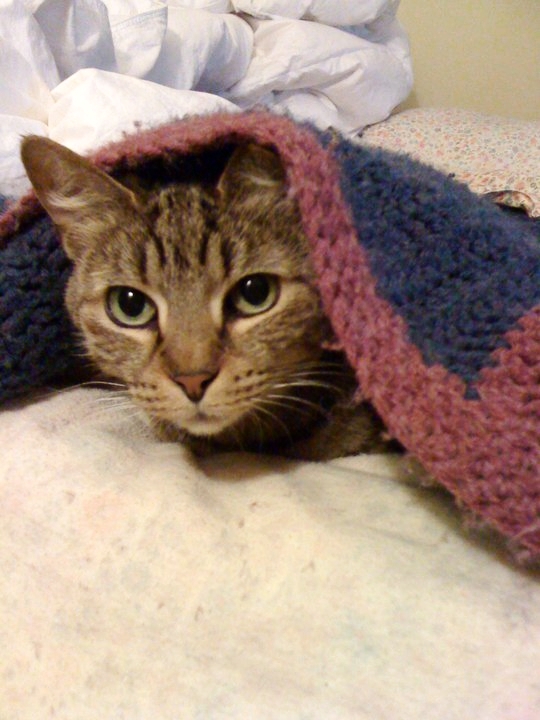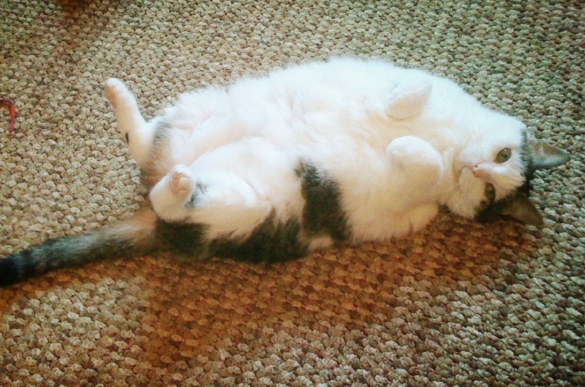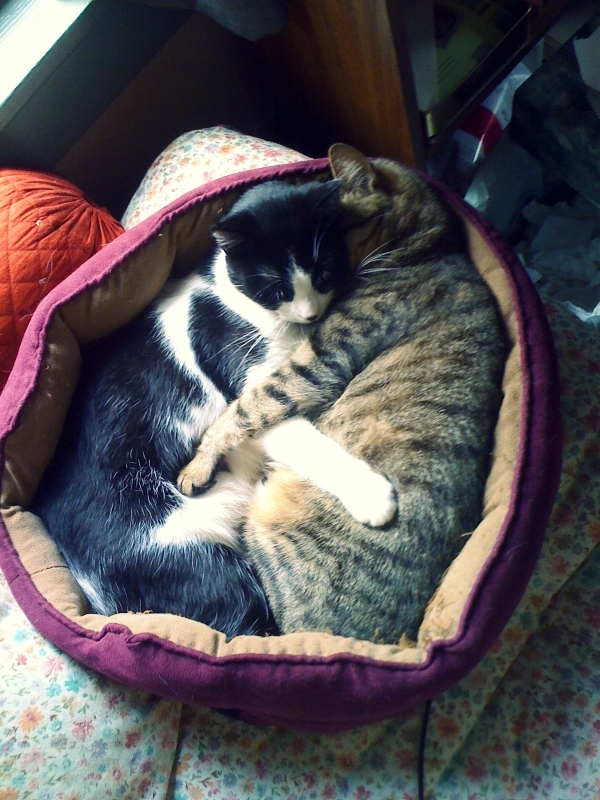Sandy Longhorn: Stranger Muses
I'm grateful for this chat with Sandy Longhorn for so many reasons. She's incredibly insightful and generous with said insight (if you get the chance, interview her at once). But so much of what she said about caring for her ill cats really resonated with me. Caring for sick animals is almost always sure to invite unwanted opinions about "quality of life," so it's a relief to hear from someone else who finds it a worthy endeavor, despite the high emotional cost.
This week, we talk about how Sandy's cats inadvertently helped her write her latest book, why caring for animals is soul-growing work, and how to be a good literary citizen.
But first, meet Sandy: she's the 2016 Porter Fund Literary Prize winner and the author of The Alchemy of My Mortal Form, winner of the 2014 Louise Bogan Award from Trio House Press, The Girlhood Book of Prairie Myths, winner of the 2013 Jacar Press Full-Length Poetry Book Contest and Blood Almanac, winner of the 2005 Anhinga Prize for Poetry. New poems have appeared or are forthcoming in Cincinnati Review, diode, Hayden's Ferry Review, Hotel Amerika, The Southeast Review, Tupelo Quarterly, and elsewhere.
Sandy holds a Master of Fine Arts degree in poetry from the University of Arkansas and a Bachelor of Arts degree in English from the College of St. Benedict. She teaches for the Arkansas Writers MFA Program at the University of Central Arkansas, Conway, AR, where she directs the C.D. Wright Women Writers Conference. In addition, she blogs at Myself the only Kangaroo among the Beauty, accompanied by her cat George.
When we first started chatting about this interview, you wrote, “My spouse and I have loved and lost three cats in our 10 years of marriage, with George still with us, who we adopted with Gracie, after the loss of Libby and Lou-Lou, each to unpreventable (and in one case bizarrely rare) diseases.”
Has losing so many companions in such a short amount of time affected how you think about or interact with your last living cat George?
With Libby and Lou-Lou, their deaths happened within months of each other, and we spent those months after Libby’s death in and out of the vet’s office trying to keep Lou-Lou alive. We were in crisis mode the entire time. Things are different now.
George is an older cat who suffers from hypothyroidism and kidney disease, but in the wake of Gracie’s death, we are only in maintenance mode and living a fairly normal life. Still, that fear hovers over us all the time. From George’s point of view, now that he is an “only” cat, he is loving all of the attention.
A few months ago, you lost your cat Gracie, and I know that was exceptionally hard for you. Has writing played a role in coping with the loss?
Writing does play a role in my coping with loss; however, not in the most direct way. Aside from a blog post, a few emails, or a Facebook update, I haven’t written directly about any of the cats or their deaths. However, that mourning pops up in my poems in other ways and adds a layer of gravitas to the work.
True or false: poetry is a form of coping.
Truth. Poetry helps me cope when writing it, sure, because I’m working through issues and emotions even when I’m not writing directly about a loss. However, for me, the real coping happens by reading the poetry of others. I was drawn to poetry first as a reader because a poem has the power to make such a quick connection with the audience and to leave memorable lines as touchstones.
"The real coping happens by reading the poetry of others."
Lou-Lou
You mentioned your third book The Alchemy of My Mortal Form (what a great title, by the way) was in part inspired by your cat Lou-Lou's rare blood marrow disease. Can you elaborate?
Thanks for the compliment on the title. This book is a collection of poems all in the voice of a single persona, a woman suffering from a difficult to diagnose illness. Her situation is complicated by the fact that she is hospitalized and completely alone. She has no visitors and only communicates with one other person through letters that may or may not ever get mailed.
I wrote the first poems right after Lou-Lou’s diagnosis and wrote much of the collection just after her death. Lou-Lou was diagnosed with “a fever of unknown origin.” When antibiotics didn’t clear it up, blood tests revealed shredded red blood cells. Working with a specialist, we eventually received a diagnosis of myelofibrosis: an immune-mediated disease causing her immune system to attack her bone marrow and make it fibrous as layers of scar tissue built up. She put up a good fight with steroids and immune system-suppressant drugs, but she died about four months after we learned the source of the fevers.
What’s odd is that the book revolves around a human being, and there isn’t a single cat in it. The drafts occurred organically, and it never crossed my mind to write about my own feelings of caring for and then losing Lou-Lou. As the poems in the book unfolded, two things were happening. One was Lou-Lou’s medical treatment by our awesome team of vets; the other was my father’s medical treatment by a host of doctors and nurses for both Parkinson’s disease and Alzheimer’s. Fortunately, my father is still with us.
"Writing the book gave me some sense of control over a situation that is always out of our control in real life."
As we worked with our vets, Chuck and I were constantly awed by their willingness to go above and beyond for our cats. Often, one of the vets would call us at 7:30 p.m. (closing time is 6:00 p.m.), still at the office, still researching treatments or just providing some feedback and comfort. These people were proactive in giving our cats the best quality of life while also fighting for that life, and when the time came to make hard decisions, our vets were compassionate and honest.
On the other hand, even today, while a few stand out as exceptional, most of my father’s doctors might not remember his name, often have schedules so full that he gets only a few minutes with them at each visit, and my mother has to raise hell to be an advocate on his behalf. It was an amazing juxtaposition, and the book turned into an indictment of what I call the “medical-industrial complex,” as the sickly speaker has to navigate her treatment, in this case, all alone without any advocacy.
The last thing I’ll say is that while Lou-Lou’s death was a fact by the time I wrote the second half of the book, I myself didn’t know if the speaker was going to live or die until I wrote the last poems. Looking back, I can see that writing the book gave me some sense of control over a situation that is always out of our control in real life.
I love that you said part of being a caregiver is “embracing empathy and sadness at the same time.” If you don’t embrace the empathy and sadness, you’re swimming upstream, right? You’d have to deal with these overwhelming feelings all while trying to take care of someone you love.
While I admit that sinking too far into the sadness of a loved one (animal or human) with a terminal diagnosis can be harmful, I believe we lean too far in the opposite direction. We are conditioned, especially in the US, to deny sadness and whitewash our mourning. For me, allowing myself to be sad throughout all three cats’ last days helped me survive their deaths.
I do believe that Libby, Lou-Lou, and Gracie have all taught me important empathetic lessons about being a caregiver and mourning a loved one. I don’t think this means I’ll weather another loss any easier, but I’ll be less confused, more caring, and more willing to give myself a break when I need one.
"We are conditioned, especially in the US, to deny sadness and whitewash our mourning."
Libby
Are there specific poems you turn to when you seek out comfort?
Mary Oliver’s “In Blackwater Woods”
Lucille Clifton’s “won’t you celebrate with me”
Stephen Dobyn’s “How to Like It”
Emily Dickinson’s “After great pain, a formal feeling comes”
Elizabeth Bishop’s “One Art”
Let’s switch gears a little. In your blog post “The Work Behind the Reward,” you write, “I've made a conscious effort to champion writers I admire, whether I know them or not. I've made a conscious effort to read widely and diversely to combat the gatekeepers. When I read a poem that blows me away, I Tweet/Facebook post about it. Often, I send private messages to a poet when I've read something that strikes me as extraordinary. Most importantly, I buy books of poetry, so many books of poetry that I don't have time to read them all.”
To me, these are the hallmarks of good literary citizenship, something I’ve been thinking a lot about lately. What other advice do you have for poets who want to support the community and make it more inclusive?
Seek out writers of work different from your own and interact with them and their work. We are living in a time of amazing access to all manner of voices. Take advantage of all that the online world has to offer (but don’t get sucked down the time-waste drain – some self-control is required).
Writing is hard, and many writers are more inclined to introversion, so going out and seeking literary events and other writers can be tough from the beginning. Once we find our crowd, I think we are in danger of inertia. This is not to discount the support of a solid literary community, but one runs the risk of stagnating and writing the same poem over and over again. Along with this, I think the poetry world, in particular, is prone to cliques and those cliques can lead to a kind of us-versus-them mentality. Before we can change this tendency, we have to be aware of it in ourselves.
All art is subjective, and I’m not saying we have to force ourselves to enjoy art that isn’t to our taste; however, if we don’t read widely, how will we know what our tastes are?
"If we don’t read widely, how will we know what our tastes are?"
Gracie
On your blog, you often write about the process of drafting your poems. Does blogging about the process help you revise the poems or write poems in general? Also, please tell us the secret to diligent blogging.
Hah! Your last statement makes me laugh. Once upon a time, I was quite diligent. In fact, you can find draft notes on the blog for all of the poems in The Alchemy of My Mortal Form and many of the poems in my second book. However, I’ve fallen out of that practice. In part, this is because I recently started a tenure-track job with more responsibilities than I had in my previous position at a community college. Like all things, blogging well takes time and concentration, two things I’ve been short on lately.
That being said, posting draft notes was once a great motivator to keep my BIC (Butt in Chair) and to keep me writing new poems. I confess that just a few comments on a blog post is enough gratification to make me want to post the next set of notes, propelling me to write the next new draft.
What projects are you working on now? I noticed a few blog posts about a “self ekphrasis” project based on your collages… tell me more!
When I’m not working on poems, I often work in collage. Last year, I starting thinking about a project where I would make a certain number of collages and then write poems in conversation with them. Once the project became a reality, I called this “self ekphrasis” since I was working with my own art, and the collages always came first.
One of my goals with this project was to try and explore my subconscious in a new way to find out if I had other obsessions lurking there. I tried my best to let the images of the collages guide the process. With the collages in hand, I sat down to draft the poems. After several false starts and a few weeks of frustration, everything clicked and I was able to draft a matching poem for each collage.
The result is “20 x 20: a Self-Ekphrastic Poetry Project,” which includes 20 collages and the 20 self-ekphrastic poems. I’ll spend the next few month revising the poems and sending out poem/collage pairs for publication. The ultimate goal is to publish a collection of the complete project.
Working my way back to George – do you think he’ll show up in a poem one of these days? And a follow-up: when are animals mostly likely to appear in your poems?
This is a great question. None of the cats have ever been mentioned in a poem, I don’t think. So, there’s a good chance this will remain true for George as well. Although, maybe this will be a new draft challenge. I admit that I might have steered away from poems about Chuck and the cats, or from even including them tangentially, because of the way these subjects often result in women’s poetry being labeled “domestic” as a way of lessening its importance.
I’m also fascinated with the next question. The animals most likely to show up in my poems are non-pets: coyotes, fox, bobcat, birds of all kinds, wolves, bears – they’ve all been there. I’ll be thinking about why this might be the case and what I’m trying to say by featuring the wild over the tamed.
"These subjects often result in women’s poetry being labeled 'domestic' as a way of lessening its importance."
Lou-Lou & Libby
A simile or metaphor for your cats?
George has a voice like a firehouse alarm when he is hungry or lonely, but he is my mindfulness guide, reminding me to stay in the moment.
Gracie was a green-eyed bowling ball of a diva; she was the only cat that never lost weight on chemotherapy.
Lou-Lou was Tony Hawk’s shadow; she could leap and zoom with the best of them.
Libby was my blood pressure medicine, hot water bottle, and bed burrower.


